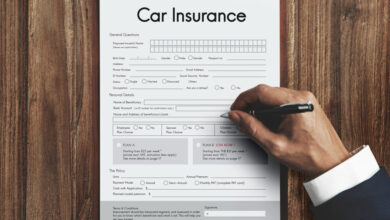Used Car Mechanical Breakdown Insurance: Complete Guide Of How It works
When you make a purchase using links on our site, we may earn an affiliate commission. Read More.
We have prepared this complete guide about how Used Car Mechanical Breakdown Insurance works, to help you stay informed.
We encourage you to read to the end of this blog post to be informed about Used Car Mechanical Breakdown Insurance.
A new car is protected with a default factory warranty that stays valid for a number of stipulated years or miles.
However, this is not the same with used cars; if you own one, you’ll need to buy some kind of insurance and warranty coverage to help reduce the cost of repairing the car (probably after an accident).
One of the types of warranty/insurance that is advisable for used car owners is mechanical breakdown insurance.
On the other hand, the standard insurance policies that protect you from unforeseen expenses are quite different from mechanical breakdown insurance.
If you want insurance coverage for collisions, physical fractures, and other types of damage that may happen to a car, you should consider extended warranty policies instead.
This article will explain much about Used Car Mechanical Breakdown Insurance (MBI), and how you can get the most out of this policy for your used car. But do check Tips on how to haggle when buying a used car.
What is Mechanical Breakdown Insurance?
This particular insurance coverage helps to cover the cost of unplanned car repairs for several issues such as brakes, oil pumps, gears, electrical systems, and other parts of the car.
However, it is very important to know that Mechanical Breakdown Insurance (MBI) basically does not cover the cost of repairing a car after an accident or fatal damage caused by the car’s driver.
It also takes care of the “Mechanical Breakdowns” in the car.
For example, if your brakes stop working or the gears become stiff, your mechanical breakdown insurance will cover the cost of fixing this issue with your car.
The insurance can also cover for electrical faults and other technical issues you may experience with your car.
Why do you need mechanical breakdown insurance for a used car?

Some people have asked this question, and it has a simple answer. Once your primary warranty expires, further costs incurred on the vehicle are solely on you.
Now, these costs can range from maintenance costs to repair costs; typically, some car repairs are very expensive, and most annoyingly, they seem to come up when you never expected it.
Since these unplanned repairs are quite inevitable, the best thing you can do is to plan ahead; hence, when they come up, you’ll be covered by insurance or have enough money to tackle them from your budget.
Furthermore, used car mechanical breakdown insurance covers the failure of major components that put a vehicle to work, such as the engine, gears, and transmission.
While it may seem similar to extended warranties, it is cheaper to afford and offers more coverage.
You can get MBI coverage for $100/yr. Nevertheless, you may have to pay up to $200 or more as a “deductible” when you apply for a repair.
What is covered in MBI?

Basically, MBI covers the major components of a car and not necessarily the body. The following are covered when you get an MBI.
- Your car engine: if the engine fails, you won’t have to spend money to fix it – your active MBI covers that.
- The brakes: brakes are among the essential components of a vehicle that tends to fail when you don’t see it coming. Also, MBI covers for brake failures in both used and new cars.
- Car power system and other technical components:when you apply for MBI, it covers all possible issues relating to your used car’s technical components or power system.
- Exhaust: some insurers may not include this coverage, but it is one of the things covered by MBI
It is also important to note that MBI can cover the following depending on policies and the insurer you decide to go with:
- Drive train
- Transmission
- Steering
- Air conditioning
- Fuel system
- And possibly more.
What’s not covered by MBI?
Obviously, MBI doesn’t cover all repairs; it is restricted to major repairs that may result from failed maintenance or accidents; standard car insurance packages can only cover such problems.
MBI does not cover the following:
- New filters and tires
- Intentional damages or damages due to carelessness
- New spark plugs
- Body fractures
- Tune-ups
Are you still interested in getting mechanical breakdown insurance for a used car? Well, it’s a good thing to do, regardless.
How much exactly is mechanical breakdown insurance?
If you want to know the exact cost of getting MBI for your used car, you should, first of all, learn about the various companies that offer this policy.
Different companies may offer different prices for used car mechanical breakdown insurance (MBI) coverage, which is added to your annual premium insurance fee.
Top companies like GEICO, CarChex, and Endurance (VSC) offer good prices alongside flexible features.
Carchex, for example, offers coverage for up to 250,000 miles, this is about 100,000 miles more than what GEICO offers.
Now, you can literally think that getting MBI from CarChex may be costlier than GEICO, but is that true?
GEICO offers a $250 deductible, and this is the same with CARCHEX. However, AAA Mechanical Breakdown Coverage offers a $100 deductible, 230,000 miles of coverage, and flexible features.
Thus, you should budget $250 per year for MBI.
However, it is advisable that you do further research about different companies that offer this policy and settle with the most affordable one.
Also, some companies do not offer MBI coverage for old cars (cars over 15 months old), while others would still provide you with MBI coverage for a 2-year-old car or an older one.
Should I buy mechanical breakdown insurance or extended warranty?
You have already learned pretty much about MBI, so let’s discuss extended warranties and see if it is preferable to MBI.
Typically, when you purchase a new car, it comes with a limited manufacturer’s warranty, sometimes called a factory warranty.

Photo credit: carchex.com
Now, this default warranty often lasts for a couple of years, let’s say 2 – 4 years, or stops after you exceed a speculated mileage with the car.
Obviously, within the warranty period, you should not care about mechanical breakdown insurance or extended warranties – this is because the factory warranty covers virtually every issue that may come up with the car. However, this is for new cars.
In contrast, when you’re buying a used car, sometimes, the factory warranty has expired already, or it’s just a few months left before the warranty expires.
Thus, after buying the car, it is advisable that you apply for some coverage policies that will help to curtail the cost of repairing the used car when certain issues come up.
While this (applying for MBI, GAP insurance, or extended warranty) may be optional, it is quite necessary that you think it out and go at least one of them.
GAP insurance for used cars helps save you some good sum after the car is stolen, and you’ve yet to complete your car finance payment. It is not basically an insurance policy that covers repairs.
Still, it is yet a considerable policy to adopt if you’re buying a used car via a dealership loan deal or lease.
On the other hand, MBI and Extended Warranties may cover some “specific” repairs, which can save you a lot as car repairs are most times costlier than expected.
Now, back to the comparison – MBI or Extended Warranty; these two policies are quite different.
The latter (extended warranty), as the name implies, is a policy that extends the primary warranty on your car.
However, the details or entailments of extended warranty coverage is liable to vary from dealerships and companies.
While extended warranties may seem a better option because they’ll cover for more stuff, MBI, on the other hand, is relatively cheaper and quite more flexible.
Also, when you’re on an MBI coverage, you can fix the car at any repair shop/outlet. But this is not the same when you are on an extended warranty coverage.
Most companies that offer extended warranties limit you to specific “approved” mechanics and repair facilities.
If you’re on extended warranty coverage and go to fix your car at your preferred repair mechanic’s facility, you’ve bridged the policy’s terms and may attract some penalties; plus, you’ll solely pay the repair cost from your budget.
Someone may ask, what if my car got spoilt at quite a far distance – not close to your extended warranty issuer’s pre-defined repair outlet or mechanic?
Well, it depends on the terms of the contract; you may need to phone the issuer to come to toll the vehicle to their trusted mechanic or repair shop.
Don’t take the risk of taking laws into your own hands as it may cost you more expense or probably, damages.
Furthermore, most car insurance companies do not offer mechanical breakdown insurance.
However, extended warranty issuers are now filling the gap on the list of companies that offer MBI (with varying rules and terms).
MBI isn’t paid upfront – it is typically added to your annual premium insurance fee as a monthly charge, unlike extended warranties where you pay upfront, and later get reimbursed.
Nevertheless, extended warranties tend to have a cheaper deductible fee; while MBI is typically locked at $250, extended warranties can be anywhere below that amount.
In fact, an extended warranty cover is quite best if you run lots of miles or own a high-value car.
Some companies that provide used car mechanical breakdown insurance (MBI) may reject high-value cars; in such scenarios, it is obvious you need an extended warranty instead.
Some key points that clearly define the differences between an extended warranty and mechanical breakdown insurance are listed below.
Issuer: MBI is only provided by certified companies since it is seen as an insurance scheme.
In contrast, third parties, dealerships, and automakers can offer extended warranties; arguably, that’s why extended warranties are costlier.
Payment scheme: Extended warranties are paid upfront or added to your car financial deal while MBI can be paid in installments (monthly).
Flexibility: You can only take your car (under extended warranty) to specific maintenance specialists or mechanic shops. But MBI allows you to fix the car at any reliable mechanic shop.
You can also choose to renew MBI coverage at the end of each year, but that’s not the same with an extended warranty.
Type of car: high-value cars are typically not eligible for MBI, but you can get extended warranty coverage for such cars.
Age of vehicle: some very old cars may not be eligible for either of these policies. The conditions for old vehicles vary by company.
Deductibles: extended warranty issuers, at most, offer $100 deductible, but MBI attracts a somewhat static $250 deductible.
There aren’t many companies offering MBI coverage; hence, that may be the reason for its high-deductible charge.
Important notice:
Different companies offer different plans, which are limited to different coverage. You may need to compare plans from different companies before settling with one.
| Comparison | Extended Warranty | MBI |
| Cost-effective | Yes | Yes |
| Different levels of coverage | Yes | Yes |
| Affected by vehicle’s age and mileage | Yes | Yes |
| Includes deductible | Yes | Yes |
| Transferrable | Yes | Yes |
| Provided by certified businesses only | Yes | No |
| Provided by third-parties or automaker | Yes | Yes |
| Up-front payment | No | Yes |
| Monthly payment | Yes | No |
The above table obviously spelled out the differences you seek between these two important policies for used cars.
What more?
Your final choice between used car mechanical breakdown insurance (MBI) and extended warranty points down to your preferences and budget.
They are quite similar, but the costs are different, and restricted to defined terms and conditions.
Insurance is not compulsory (especially when it’s not the primary insurance required by your state government).
You must not buy an MBI coverage or extended warranty coverage, but you’d save yourself some uncalled expenses if you do.
Imagine having to take care of a $1000 repair cost from your personal budget.
That can really affect your plans and other things. Hence, insurance and warranties are advisable.
No one can perfectly predict what’s going to break down in his/her car – always think SAFETY.
More tips on choosing the best insurance or buying the best-used car within your budget can be found on our homepage.









